英语介词用法整理
40个英语介词用法总结
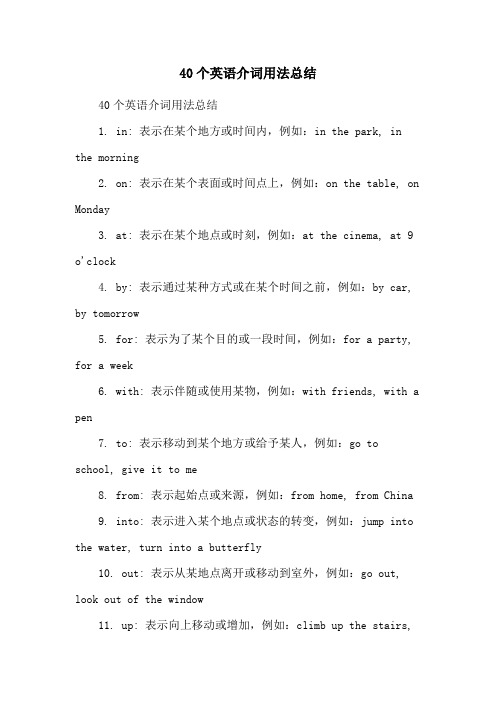
40个英语介词用法总结40个英语介词用法总结1. in: 表示在某个地方或时间内,例如:in the park, in the morning2. on: 表示在某个表面或时间点上,例如:on the table, on Monday3. at: 表示在某个地点或时刻,例如:at the cinema, at 9 o'clock4. by: 表示通过某种方式或在某个时间之前,例如:by car, by tomorrow5. for: 表示为了某个目的或一段时间,例如:for a party, for a week6. with: 表示伴随或使用某物,例如:with friends, with a pen7. to: 表示移动到某个地方或给予某人,例如:go to school, give it to me8. from: 表示起始点或来源,例如:from home, from China9. into: 表示进入某个地点或状态的转变,例如:jump into the water, turn into a butterfly10. out: 表示从某地点离开或移动到室外,例如:go out, look out of the window11. up: 表示向上移动或增加,例如:climb up the stairs,wake up12. down: 表示向下移动或减少,例如:walk down the hill, calm down13. about: 表示关于某事或在某个范围内,例如:talk about the movie, wander about the city14. off: 表示离开或关闭,例如:get off the bus, turnoff the lights15. on: 表示打开或激活,例如:turn on the TV, switch on the computer16. over: 表示越过或在某地上方,例如:jump over the fence, fly over the city17. under: 表示在某物下面或被控制或影响,例如:hide under the bed, live under his rules18. with: 表示具有某种特征或和某人一起做某事,例如:a man with blue eyes, dance with me19. without: 表示没有某物或在缺乏某物的情况下,例如:go without food, live without regret20. by: 表示通过某种方式,例如:learn by doing, go by bus21. through: 表示穿过某物或完成某事,例如:walk through the door, go through the documents22. across: 表示横穿某物或在某个范围内,例如:swimacross the river, all across the world23. between: 表示在两个事物之间或在某个时间段,例如:choose between two options, between 9 and 10 o'clock24. among: 表示在三个或三个以上事物之间或在某群人中,例如:share among friends, discuss among colleagues25. around: 表示在周围或在某个时间点附近,例如:walk around the park, around midnight26. through: 表示通过某事物或在某段时间内,例如:read through the book, work through the night27. against: 表示反对或靠在某物上,例如:fight against injustice, lean against the wall28. for: 表示代表或支持某人或某事,例如:vote for a candidate, fight for freedom29. towards: 表示朝向某个方向或对某人有好感,例如:walk towards the beach, feel towards someone30. within: 表示在某个时间或范围内,例如:arrive within an hour, within the city limits31. beyond: 表示超出某个界限或超过某个程度,例如:beyond expectations, beyond the horizon32. along: 表示沿着某个路线或伴随某人一起,例如:walk along the street, sing along with the song33. above: 表示在某物之上或高于某个程度,例如:flyabove the clouds, above average34. below: 表示在某物之下或低于某个程度,例如:swim below the surface, below freezing35. beside: 表示在某物旁边或和某人一起,例如:sit beside me, beside the lake36. near: 表示在某物附近或接近某个时间,例如:live near the beach, near the end37. past: 表示经过某个地点或在某个时间之后,例如:walk past the store, past midnight38. around: 表示在周围或大约某个数量,例如:look around the room, around 20 people39. after: 表示在某个时间之后或追求某人或某事,例如:after dinner, run after the dog40. before: 表示在某个时间之前或在某个事件之前,例如:before sunrise, before the meeting这些介词是英语中常用的一些基本介词,它们在表达地点、时间、方式等方面起到了重要的作用。
介词英语的用法总结
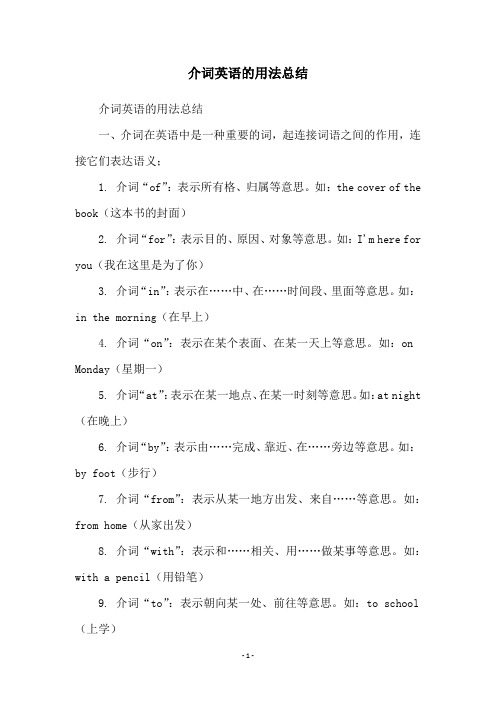
介词英语的用法总结介词英语的用法总结一、介词在英语中是一种重要的词,起连接词语之间的作用,连接它们表达语义;1. 介词“of”:表示所有格、归属等意思。
如:the cover of the book(这本书的封面)2. 介词“for”:表示目的、原因、对象等意思。
如:I'm here for you(我在这里是为了你)3. 介词“in”:表示在……中、在……时间段、里面等意思。
如:in the morning(在早上)4. 介词“on”:表示在某个表面、在某一天上等意思。
如:on Monday(星期一)5. 介词“at”:表示在某一地点、在某一时刻等意思。
如:at night (在晚上)6. 介词“by”:表示由……完成、靠近、在……旁边等意思。
如:by foot(步行)7. 介词“from”:表示从某一地方出发、来自……等意思。
如:from home(从家出发)8. 介词“with”:表示和……相关、用……做某事等意思。
如:with a pencil(用铅笔)9. 介词“to”:表示朝向某一处、前往等意思。
如:to school (上学)10.介词“for”:表示为了……、把……作为等意思。
如:for fun (为了好玩)11.介词“as”:表示作为、当……时等意思。
如:as a teacher (作为一个老师)12.介词“over”:表示在……上、穿过等意思。
如:over the bridge (过桥)13.介词“since”:表示从……起、既然等意思。
如:since then (从那时起)14.介词“into”:表示到……里面、转向等意思。
如:into the room(进房间)二、最后,需要强调的是,介词的使用要灵活搭配,以正确表达出英语句子的意思,以便达到更好的英语表达效果。
介词的用法归纳
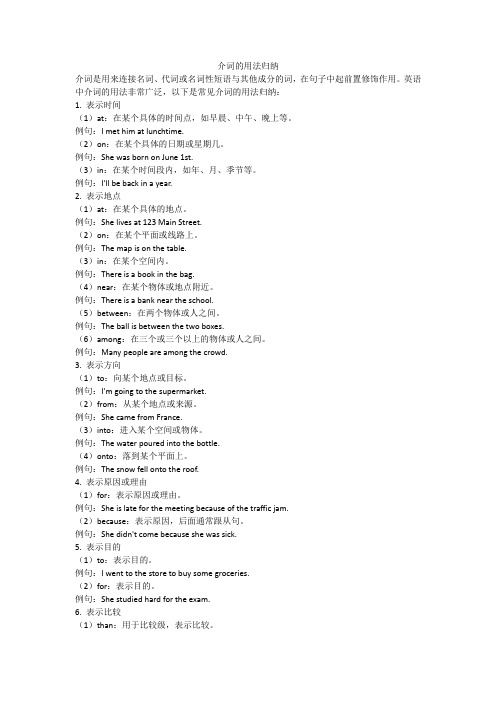
介词的用法归纳介词是用来连接名词、代词或名词性短语与其他成分的词,在句子中起前置修饰作用。
英语中介词的用法非常广泛,以下是常见介词的用法归纳:1. 表示时间(1)at:在某个具体的时间点,如早晨、中午、晚上等。
例句:I met him at lunchtime.(2)on:在某个具体的日期或星期几。
例句:She was born on June 1st.(3)in:在某个时间段内,如年、月、季节等。
例句:I'll be back in a year.2. 表示地点(1)at:在某个具体的地点。
例句:She lives at 123 Main Street.(2)on:在某个平面或线路上。
例句:The map is on the table.(3)in:在某个空间内。
例句:There is a book in the bag.(4)near:在某个物体或地点附近。
例句:There is a bank near the school.(5)between:在两个物体或人之间。
例句:The ball is between the two boxes.(6)among:在三个或三个以上的物体或人之间。
例句:Many people are among the crowd.3. 表示方向(1)to:向某个地点或目标。
例句:I'm going to the supermarket.(2)from:从某个地点或来源。
例句:She came from France.(3)into:进入某个空间或物体。
例句:The water poured into the bottle.(4)onto:落到某个平面上。
例句:The snow fell onto the roof.4. 表示原因或理由(1)for:表示原因或理由。
例句:She is late for the meeting because of the traffic jam.(2)because:表示原因,后面通常跟从句。
介词用法总结

介词用法总结介词是英语语法中一个重要的词类,用于表示名词、代词、动词和形容词等与其他词或短语之间的关系。
在不同的句子和语境中,介词具有不同的用法。
本文将对介词的用法进行总结,并提供相关的例句。
一、表示位置关系的介词1. in:在…之中,在(具体范围)。
例句:He is waiting in the car.(他正在车里等待。
)2. on:在…之上,在(水平面)。
例句:The book is on the table.(书在桌子上。
)3. at:在…地方,在(具体点)。
例句:She is studying at the library.(她在图书馆学习。
)4. by:在…旁边,靠近(某物)。
例句:He is standing by the door.(他站在门旁边。
)5. under:在…下面,在(某物)的底部。
例句:The cat is hiding under the bed.(猫在床下躲藏。
)6. between:在…之间(两者之间)。
例句:The restaurant is located between the bank and the supermarket.(这家餐厅位于银行和超市之间。
)二、表示时间关系的介词1. at:在(具体时间点)。
例句:She will meet her friend at 8 o'clock.(她将在8点钟见她的朋友。
)2. on:在(具体日期或星期)。
例句:I have a meeting on Monday.(星期一我有个会议。
)3. in:在(一段时间内)。
例句:He will travel to Europe in summer.(他将在夏天去欧洲旅行。
)4. during:在…期间,表示全程。
例句:I read a book during the flight.(我在飞行途中读了一本书。
)5. for:持续时间,表示时间段。
例句:They have been married for ten years.(他们已经结婚十年了。
史上超全的英语介词用法归纳总结!不看太可惜了
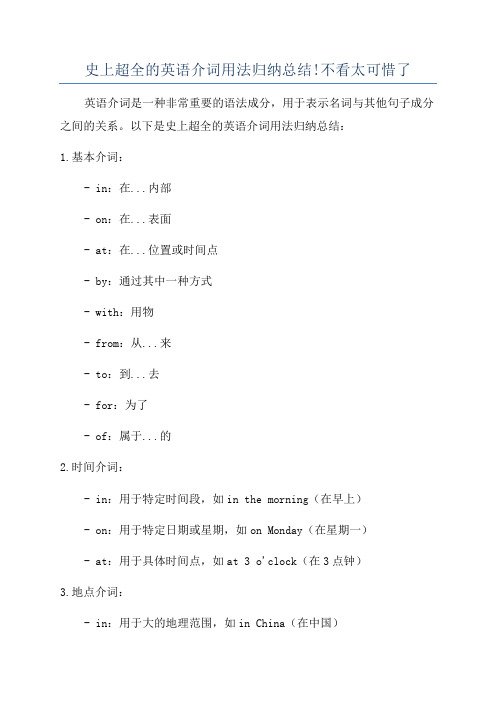
史上超全的英语介词用法归纳总结!不看太可惜了英语介词是一种非常重要的语法成分,用于表示名词与其他句子成分之间的关系。
以下是史上超全的英语介词用法归纳总结:1.基本介词:- in:在...内部- on:在...表面- at:在...位置或时间点- by:通过其中一种方式- with:用物- from:从...来- to:到...去- for:为了- of:属于...的2.时间介词:- in:用于特定时间段,如in the morning(在早上)- on:用于特定日期或星期,如on Monday(在星期一)- at:用于具体时间点,如at 3 o'clock(在3点钟)3.地点介词:- in:用于大的地理范围,如in China(在中国)- on:用于较小的地理范围或表面,如on the street(在街上)- at:用于具体地点,如at the supermarket(在超市)4.方向介词:- to:表示到达一些地方,如go to school(去学校)- into:表示进入一些地方,如go into the house(进入房子)- out of:表示离开一些地方,如get out of the car(离开车)5.原因介词:- because of:由于,如He is late because of the traffic(他因为交通堵塞而迟到)- due to:由于,如The flight was canceled due to bad weather(因为恶劣天气,航班被取消)6.动词短语介词:- look after:照顾,如She looks after her younger brother (她照顾她的弟弟)- take care of:照顾,如He takes care of his plants(他照顾他的植物)7.形容词短语介词:- interested in:对...感兴趣,如She is interested in music (她对音乐感兴趣)- good at:擅长...,如He is good at playing basketball(他擅长打篮球)8.其他常见介词用法:- with regard to:关于,如With regard to the matter, I have something to say(关于这件事,我有些话要说)- instead of:代替,如I will go instead of him(我将代替他去)- according to:根据,如According to the weather forecast, it will rain tomorrow(根据天气预报,明天会下雨)以上是一些常见的英语介词用法总结,希望能帮到你!。
40个介词用法总结

40个介词用法总结介词是英语中非常重要的一类词性,它在句子中起着连接词与词、短语与短语的作用。
介词的正确使用对于句子的表达和理解至关重要。
下面将介绍40个常见介词的用法总结,希望能够帮助大家更好地掌握介词的用法。
1. about。
介词about表示“关于”,用于询问或表达主题或内容。
例如,What are you talking about?(你在谈论什么?)。
2. above。
介词above表示“在……之上”,用于表示位置关系。
例如,The sun is above the clouds.(太阳在云层之上。
)。
3. across。
介词across表示“横过,穿过”,用于表示横跨某个区域或穿过某个物体。
例如,We walked across the bridge.(我们走过了桥。
)。
4. after。
介词after表示“在……之后”,用于表示时间先后关系。
例如,We'll go for a walk after dinner.(晚饭后我们会去散步。
)。
5. against。
介词against表示“靠着,依靠”,用于表示两个物体之间的接触或支撑关系。
例如,He leaned against the wall.(他靠在墙上。
)。
6. along。
介词along表示“沿着”,用于表示沿着某个方向或路线。
例如,We walked along the river.(我们沿着河边走。
)。
7. amid。
介词amid表示“在……之中”,用于表示某个场所或环境中。
例如,The children played happily amid the flowers.(孩子们在花丛中快乐地玩耍。
)。
8. among。
介词among表示“在……之中”,用于表示三个或三个以上的人或物之间的关系。
例如,She is among the top students in her class.(她是班里的尖子学生之一。
)。
9. around。
英语介词用法大全

英语介词用法大全★早、午、晚要用in,at黎明、午夜、点与分。
年、月、年月、季节、周,阳光、灯、影、衣、冒in。
将来时态in...以后,小处at大处in。
有形with无形by,语言、单位、材料in。
特征、方面与方式,心情成语惯用in。
介词at和to表方向,攻击、位置、恶、善分。
★日子、日期、年月日,星期加上早、午、晚,收音、农场、值日on,关于、基础、靠、著论。
着、罢、出售、偷、公、假,故意、支付、相反,准。
特定时日和“一……就”,on后常接动名词。
年、月、日加早、午、晚,of之前on代in。
步行、驴、马、玩笑on,cab,carriage则用in。
★at山脚、门口、在当前,速、温、日落、价、核心。
工具、和、同随with,具有、独立、就、原因。
就……来说宾译主,对、有、方状、表细分。
海、陆、空、车、偶、被by,单数、人类know to man。
★this、that、tomorrow,yesterday,next、last、one。
接年、月、季、星期、周,介词省略已习惯。
over、under正上下,above、below则不然,若与数量词连用,混合使用亦无关。
…beyond超出、无、不能,against靠着,对与反。
besides,except分内外,among之内along沿。
同类比较except,加for异类记心间。
★原状because of,、owing to、due to表语形容词under后接修、建中,of、from物、化分。
★before、after表一点, ago、later表一段。
before能接完成时,ago过去极有限。
since以来during间,since时态多变换。
与之相比beside,除了last but one。
复不定for、找、价、原,对、给、段、去、为、作、赞。
快到、对、向towards,工、学、军、城、北、上、南。
but for否定用虚拟,复合介词待后言。
ing型由于鉴,除了除外与包合。
英语介词用法详解

英语介词是连接名词、代词或名词短语与其他词语的词,它们在句中不能单独作句子成分,需要与它们的宾语一起构成介词短语。
介词的用法多种多样,以下是一些常见英语介词的用法详解:1. 时间介词:- at:表示在某一具体时刻,如“At 6 o'clock”。
- on:表示在具体的某一天或某一天的上午、下午、晚上,如“On Monday”或“On the morning of July 4th”。
- in:表示在一段时间内,如“In the summer”或“In the 20th century”。
- by:表示在某一时间之前,如“By 5 o'clock”。
- before:表示在某一时间之前,如“Before lunch”。
- after:表示在某一时间之后,如“After the meeting”。
- since:表示自从某一时间以来,如“Since last month”。
- until/till:表示直到某一时间为止,如“Until 9 o'clock”或“Till the end of the day”。
2. 地点介词:- at:表示在某一地点,如“At the library”。
- in:表示在某一地区、城市或国家,如“In New York”或“In France”。
- on:表示在某一平面或表面,如“On the table”或“On the floor”。
- above:表示在某一地点的上方,如“Above the clouds”。
- below:表示在某一地点的下方,如“Below the bridge”。
- near:表示靠近某一地点,如“Near the river”。
- between:表示在两者之间,如“Between the trees”。
- beyond:表示超过某一地点,如“Beyond the horizon”。
3. 方式介词:- by:表示通过某种方式或手段,如“By car”或“By phone”。
(完整word版)介词用法归纳,推荐文档
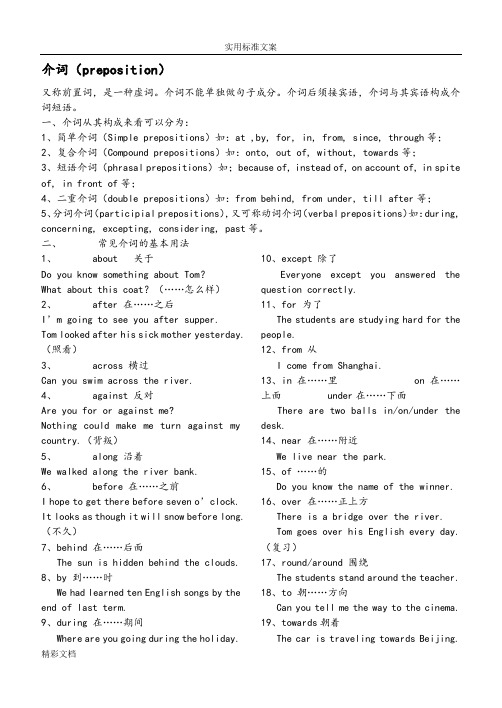
介词(preposition)又称前置词,是一种虚词。
介词不能单独做句子成分。
介词后须接宾语,介词与其宾语构成介词短语。
一、介词从其构成来看可以分为:1、简单介词(Simple prepositions)如:at ,by, for, in, from, since, through等;2、复合介词(Compound prepositions)如:onto, out of, without, towards等;3、短语介词(phrasal prepositions)如;because of, instead of, on account of, in spite of, in front of等;4、二重介词(double prepositions)如:from behind, from under, till after等;5、分词介词(participial prepositions),又可称动词介词(verbal prepositions)如:during, concerning, excepting, considering, past等。
二、常见介词的基本用法1、 about 关于Do you know something about Tom?What about this coat?(……怎么样)2、 after 在……之后I’m going to see you after supper. Tom looked after his sick mother yesterday.(照看)3、 across 横过Can you swim across the river.4、 against 反对Are you for or against me?Nothing could make me turn against my country.(背叛)5、 along 沿着We walked along the river bank.6、 before 在……之前I hope to get there before seven o’clock. It looks as though it will snow before long.(不久)7、behind 在……后面The sun is hidden behind the clouds.8、by 到……时We had learned ten English songs by the end of last term.9、during 在……期间Where are you going during the holiday. 10、except 除了Everyone except you answered the question correctly.11、for 为了The students are studying hard for the people.12、from 从I come from Shanghai.13、in 在……里 on 在……上面 under在……下面There are two balls in/on/under the desk.14、near 在……附近We live near the park.15、of ……的Do you know the name of the winner.16、over 在……正上方There is a bridge over the river.Tom goes over his English every day.(复习)17、round/around 围绕The students stand around the teacher.18、to 朝……方向Can you tell me the way to the cinema.19、towards朝着The car is traveling towards Beijing.20、with 和……一起me?Would you like to go to the cinema with学习这些介词时可以先记住它的汉语意思,然后参照例句来加深理解,并在今后的学习中加以灵活运用。
英语介词的用法归纳
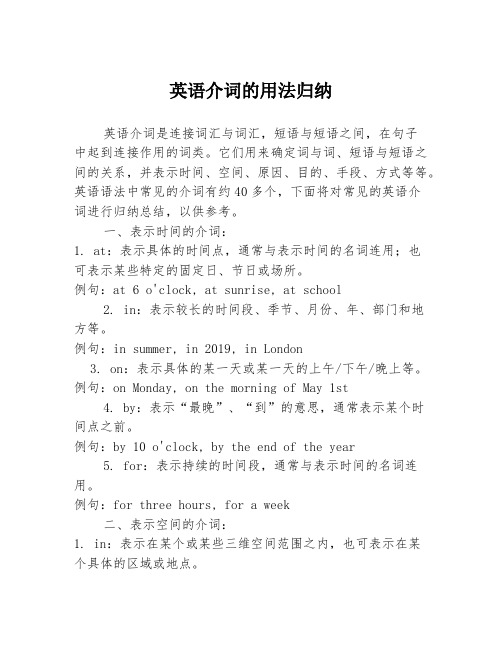
英语介词的用法归纳英语介词是连接词汇与词汇,短语与短语之间,在句子中起到连接作用的词类。
它们用来确定词与词、短语与短语之间的关系,并表示时间、空间、原因、目的、手段、方式等等。
英语语法中常见的介词有约40多个,下面将对常见的英语介词进行归纳总结,以供参考。
一、表示时间的介词:1. at:表示具体的时间点,通常与表示时间的名词连用;也可表示某些特定的固定日、节日或场所。
例句:at 6 o'clock, at sunrise, at school2. in:表示较长的时间段、季节、月份、年、部门和地方等。
例句:in summer, in 2019, in London3. on:表示具体的某一天或某一天的上午/下午/晚上等。
例句:on Monday, on the morning of May 1st4. by:表示“最晚”、“到”的意思,通常表示某个时间点之前。
例句:by 10 o'clock, by the end of the year5. for:表示持续的时间段,通常与表示时间的名词连用。
例句:for three hours, for a week二、表示空间的介词:1. in:表示在某个或某些三维空间范围之内,也可表示在某个具体的区域或地点。
例句:in the room, in the park2. on:表示在某个平面面上,通常用来表示地点。
例句:on the table, on the wall3. at:表示在某个具体的地点或位置。
例句:at the door, at the bus stop4. by:表示“靠近”、“经过”等含义。
例句:by the river, by the window5. between:表示在两个或两个以上的物体或位置之间。
例句:between two mountains, between the buildings6. among:表示在三个或三个以上的物体或位置之间。
40个英语介词用法总结
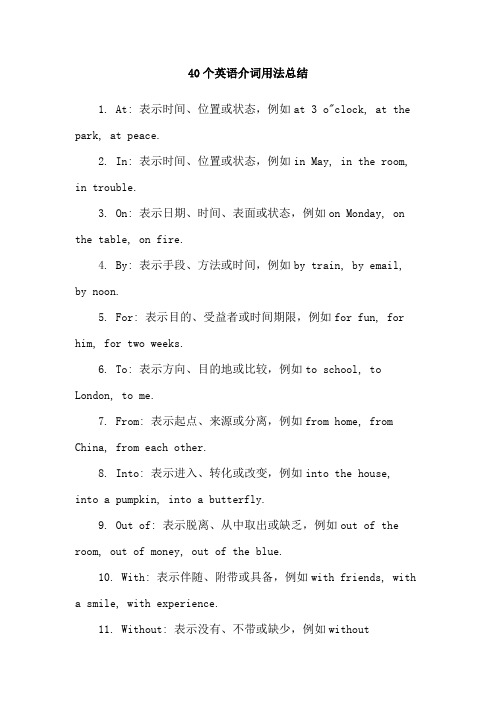
40个英语介词用法总结1. At: 表示时间、位置或状态,例如at 3 o"clock, at the park, at peace.2. In: 表示时间、位置或状态,例如in May, in the room, in trouble.3. On: 表示日期、时间、表面或状态,例如on Monday, on the table, on fire.4. By: 表示手段、方法或时间,例如by train, by email, by noon.5. For: 表示目的、受益者或时间期限,例如for fun, for him, for two weeks.6. To: 表示方向、目的地或比较,例如to school, to London, to me.7. From: 表示起点、来源或分离,例如from home, from China, from each other.8. Into: 表示进入、转化或改变,例如into the house,into a pumpkin, into a butterfly.9. Out of: 表示脱离、从中取出或缺乏,例如out of the room, out of money, out of the blue.10. With: 表示伴随、附带或具备,例如with friends, witha smile, with experience.11. Without: 表示没有、不带或缺少,例如withoutpermission, without shoes, without doubt.12. Over: 表示覆盖、超过或结束,例如over the roof, over the limit, over and done with.13. Under: 表示在下面、被支配或不足,例如under the table, under his control, under budget.14. About: 表示关于、大约或忙于,例如about the movie, about 10 dollars, about to leave.15. Above: 表示在上面、高于或超过,例如above the clouds, above average, above suspicion.16. Below: 表示在下面、低于或不足,例如below the surface, below freezing, below par.17. Across: 表示横穿、相交或涉及,例如across the street, across the board, across his mind.18. Beyond: 表示超出、远离或除了,例如beyond repair, beyond belief, beyond her control.19. Around: 表示周围、附近或环绕,例如around the corner, around the clock, around the world.20. Before: 表示以前、在前面或比较,例如before noon, before the house, before his time.21. Behind: 表示在后面、落后或背后,例如behind the house, behind schedule, behind the scenes.22. Beside: 表示在旁边、与...相比或附加,例如besidethe river, beside myself, beside the point.23. Inside: 表示内部、在里面或被包含,例如inside the box, inside the building, inside information.24. Outside: 表示外部、在外面或超出,例如outside the house, outside the box, outside the norm.25. Through: 表示穿过、经过或完成,例如through the door, through the park, through with it.26. Throughout: 表示遍布、贯穿或在整个期间,例如throughout the city, throughout history, throughout the day.27. Towards: 表示朝向、对于或接近,例如towards the sun, towards him, towards the end.28. Against: 表示反对、抵抗或紧挨着,例如against the law, against the current, against the wall.29. Among: 表示在...之中、相互之间或被分配到,例如among friends, among the stars, among the winners.30. Between: 表示在两者之间、在中间或相互之间,例如between two trees, between classes, between you and me.31. Within: 表示在内部、在范围之内或在规定时间内,例如within the house, within the budget, within a week.32. Without: 表示在外面、没有或不用,例如without the room, without a doubt, without further ado.33. Beneath: 表示在下面、低于或不足,例如beneath the surface, beneath his dignity, beneath contempt.34. Beside: 表示在旁边、与...相比或附加,例如beside the river, beside myself, beside the point.35. Into: 表示进入、转化或改变,例如into the house, into a pumpkin, into a butterfly.36. Upon: 表示在...之上、一旦发生或基于,例如upon the hill, upon arrival, upon further consideration.37. With: 表示伴随、附带或具备,例如with friends, witha smile, with experience.38. Within: 表示在内部、在范围之内或在规定时间内,例如within the house, within the budget, within a week.39. Without: 表示没有、不带或缺少,例如without permission, without shoes, without doubt.40. Beneath: 表示在下面、低于或不足,例如beneath the surface, beneath his dignity, beneath contempt.。
英语介词用法整理总结(超全面)
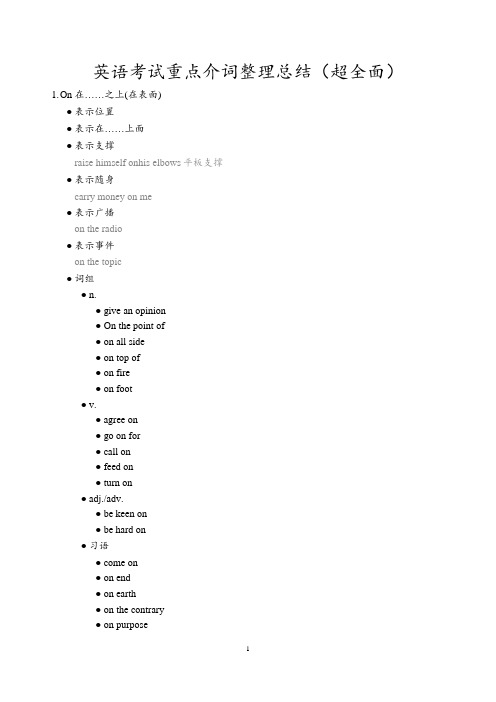
英语考试重点介词整理总结(超全面)1.O n 在……之上(在表面)●表示位置●表示在……上面●表示支撑raise himself onhis elbows平板支撑●表示随身carry money on me●表示广播on the radio●表示事件on the topic●词组●n.●give an opinion●On the point of●on all side●on top of●on fire●on foot●v.●agree on●go on for●call on●feed on●turn on●adj./adv.●be keen on●be hard on●习语●come on●on end●on earth●on the contrary●on purpose2.I n 在……里面●含义●表示位置●表示在作品中is the book●表示时间段●在状态in the trouble●表示方式in English , in print●表示穿着in a suit●词组●n.●arm in arm●a case in point一个典型的例子●in a hurry●in detail●in turn●in spite of●v.●abound in●get in touch with●keep in touch●adj/adv.●be abound in●be absorbed in专心致力于……3.A t 在(一个点)●含义●表示地点/场所●在旁边at the table●表示距离at certain distance, at an angle●表示时刻at 3am.●表示年龄at the age of 17●词组●at bottom●glance at●run out of 达到(某数字)●feel amused at●not at all4.o f 属于……的●含义●表示特征the aim of the course●表示从属特点Bank of China●表示数量a piece of paper●表示动作building of house●词组●n.●take advantage of●back of●take care of●v.●accuse sb. ofsth.●consist of●die of●adj./adv.●ahead of●be afraid of●be full of5.f or 为了●6.b y 依靠●含义●表示人He was brought up by his father.●表示手段by car●表示巧合I met by chance.碰运气。
介词的总结归纳
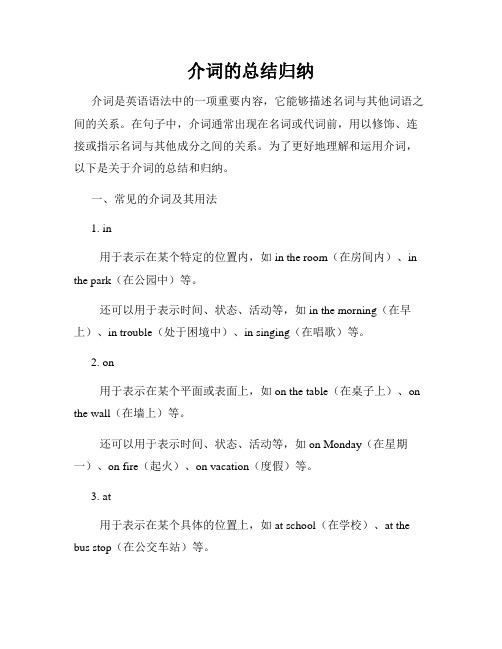
介词的总结归纳介词是英语语法中的一项重要内容,它能够描述名词与其他词语之间的关系。
在句子中,介词通常出现在名词或代词前,用以修饰、连接或指示名词与其他成分之间的关系。
为了更好地理解和运用介词,以下是关于介词的总结和归纳。
一、常见的介词及其用法1. in用于表示在某个特定的位置内,如 in the room(在房间内)、in the park(在公园中)等。
还可以用于表示时间、状态、活动等,如 in the morning(在早上)、in trouble(处于困境中)、in singing(在唱歌)等。
2. on用于表示在某个平面或表面上,如 on the table(在桌子上)、on the wall(在墙上)等。
还可以用于表示时间、状态、活动等,如 on Monday(在星期一)、on fire(起火)、on vacation(度假)等。
3. at用于表示在某个具体的位置上,如 at school(在学校)、at the bus stop(在公交车站)等。
还可以用于表示时间、活动等,如 at noon(在中午)、at a party (在派对上)等。
4. to用于表示运动的方向或目的地,如 go to school(去学校)、senda letter to her(给她发信)等。
还可以用于表示时间,如from Monday to Friday(从周一到周五)等。
5. for用于表示目的、原因或受益人,如 buy flowers for her(给她买花)、study for the exam(为了考试而学习)等。
6. with用于表示伴随、一起、使用等,如 go shopping with friends(和朋友一起去购物)、write with a pen(用钢笔写)等。
7. by用于表示通过某种方式或由某人完成某事,如 travel by train(乘火车旅行)、written by Mark(由马克写的)等。
介词常见11个用法归纳

介词常见11个用法归纳介词是连接词语与其他词语或词组的一种词类。
以下是介词的常见用法归纳:1. 表示地点:at, in, on例如:at school(在学校)、in the park(在公园)、on the table(在桌子上)2. 表示方向:to例如:go to the library(去图书馆)3. 表示时间:at, in, on例如:at 9 o'clock(在9点)、in July(在七月)、on Monday(在星期一)4. 表示原因:because of, due to例如:He failed the test because of his laziness(他因为懒惰而考试不及格)5. 表示目的:for例如:I bought some flowers for my mother(我买了些花给我妈妈)6. 表示手段或方式:by, with例如:She traveled to Paris by plane(她乘飞机去巴黎)7. 表示比较:than例如:He is taller than his sister(他比他姐姐高)8. 表示身份或性质:as例如:He works as a doctor(他是个医生)9. 表示关系:of例如:a book of poems(一个诗集)10. 表示来源:from例如:I received a gift from my friend(我收到了一份来自朋友的礼物)11. 表示递进或对比:besides, but, except, apart from例如:She likes all kinds of food, besides seafood(她喜欢各种食物,除了海鲜)。
英语介词用法最全总结
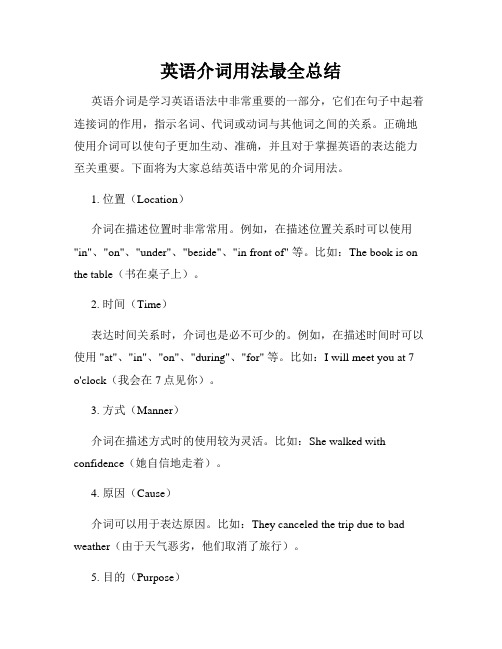
英语介词用法最全总结英语介词是学习英语语法中非常重要的一部分,它们在句子中起着连接词的作用,指示名词、代词或动词与其他词之间的关系。
正确地使用介词可以使句子更加生动、准确,并且对于掌握英语的表达能力至关重要。
下面将为大家总结英语中常见的介词用法。
1. 位置(Location)介词在描述位置时非常常用。
例如,在描述位置关系时可以使用"in"、"on"、"under"、"beside"、"in front of" 等。
比如:The book is on the table(书在桌子上)。
2. 时间(Time)表达时间关系时,介词也是必不可少的。
例如,在描述时间时可以使用 "at"、"in"、"on"、"during"、"for" 等。
比如:I will meet you at 7 o'clock(我会在7点见你)。
3. 方式(Manner)介词在描述方式时的使用较为灵活。
比如:She walked with confidence(她自信地走着)。
4. 原因(Cause)介词可以用于表达原因。
比如:They canceled the trip due to bad weather(由于天气恶劣,他们取消了旅行)。
5. 目的(Purpose)介词也能表达目的。
比如:He went to the store to buy some groceries (他去商店买些食品)。
6. 所属关系(Possession)介词可以用于表达所属关系。
比如:This book belongs to me(这本书是我的)。
7. 比较(Comparison)在进行比较时,介词也可以派上用场。
比如:I am taller than my sister(我比我妹妹高)。
英语介词的用法归纳
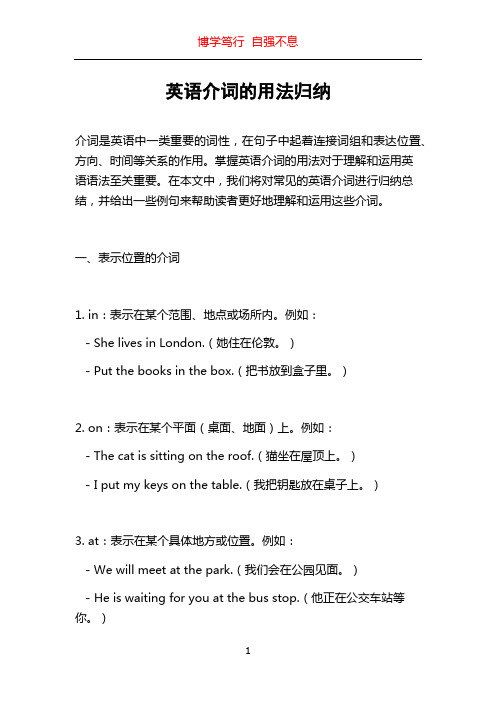
英语介词的用法归纳介词是英语中一类重要的词性,在句子中起着连接词组和表达位置、方向、时间等关系的作用。
掌握英语介词的用法对于理解和运用英语语法至关重要。
在本文中,我们将对常见的英语介词进行归纳总结,并给出一些例句来帮助读者更好地理解和运用这些介词。
一、表示位置的介词1. in:表示在某个范围、地点或场所内。
例如:- She lives in London.(她住在伦敦。
)- Put the books in the box.(把书放到盒子里。
)2. on:表示在某个平面(桌面、地面)上。
例如:- The cat is sitting on the roof.(猫坐在屋顶上。
)- I put my keys on the table.(我把钥匙放在桌子上。
)3. at:表示在某个具体地方或位置。
例如:- We will meet at the park.(我们会在公园见面。
)- He is waiting for you at the bus stop.(他正在公交车站等你。
)二、表示方向的介词1. to:表示动作的方向。
例如:- I went to the supermarket.(我去了超市。
)- She walked to the park.(她走到了公园。
)2. into:表示进入某个地方或物体内部。
例如:- The cat jumped into the box.(猫跳进了盒子里。
)- He put the book into his bag.(他把书放进了书包里。
)3. out of:表示离开某个地方或物体外部。
例如:- She ran out of the room.(她从房间里跑了出来。
)- Take the dishes out of the dishwasher.(把盘子从洗碗机里取出来。
)三、表示时间的介词1. at:表示具体的时间点。
例如:- The party starts at 7 p.m.(晚会从晚上7点开始。
(详细版)介词的用法总结
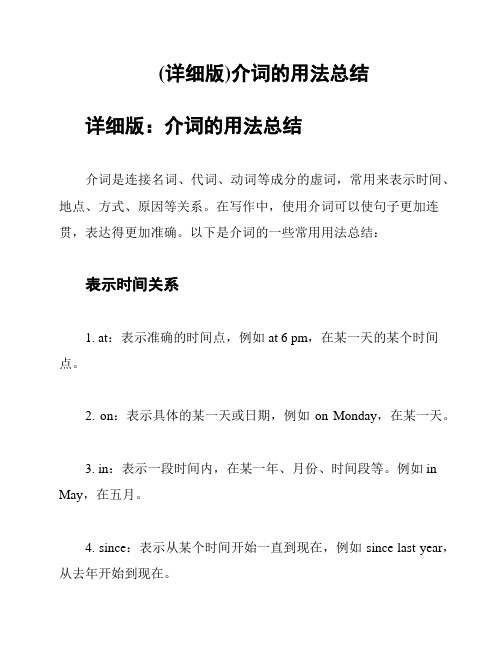
(详细版)介词的用法总结详细版:介词的用法总结介词是连接名词、代词、动词等成分的虚词,常用来表示时间、地点、方式、原因等关系。
在写作中,使用介词可以使句子更加连贯,表达得更加准确。
以下是介词的一些常用用法总结:表示时间关系1. at:表示准确的时间点,例如 at 6 pm,在某一天的某个时间点。
2. on:表示具体的某一天或日期,例如on Monday,在某一天。
3. in:表示一段时间内,在某一年、月份、时间段等。
例如 in May,在五月。
4. since:表示从某个时间开始一直到现在,例如 since last year,从去年开始到现在。
5. for:表示持续的时间,在某段时间内。
例如 for two hours,持续两个小时。
表示地点关系1. at:表示在某个位置。
例如 at home,在家。
2. on:表示在一个平面面上。
例如 on the table,在桌子上。
3. in:表示在一个封闭的空间内。
例如in the room,在房间里。
4. to:表示到某个地方。
例如 go to school,去学校。
表示方式、原因、目的等关系1. by:表示通过某种方式。
例如 by plane,乘飞机。
2. with:表示用某种工具或伴随某人物。
例如 write with pen,用笔写。
3. for:表示为了某种目的。
例如 for health,为了健康。
4. because of:表示因为某种原因。
例如 because of the rain,因为下雨。
以上只是介词用法的一部分,需要灵活运用,不要生搬硬套,以免出现错误。
希望以上总结对您有所帮助。
介词英语用法
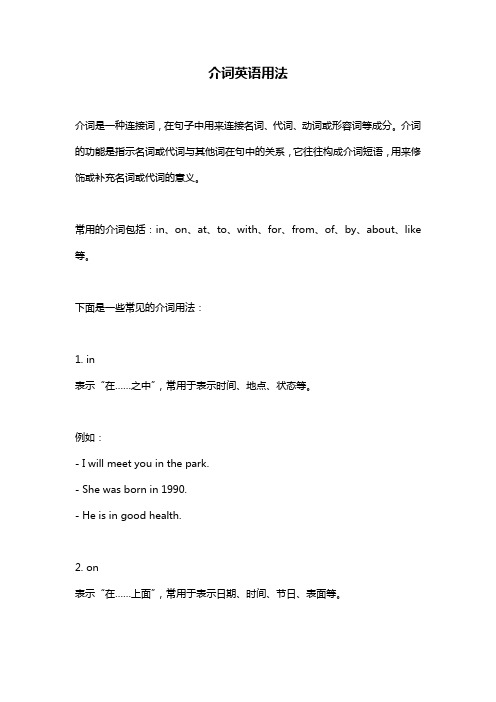
介词英语用法介词是一种连接词,在句子中用来连接名词、代词、动词或形容词等成分。
介词的功能是指示名词或代词与其他词在句中的关系,它往往构成介词短语,用来修饰或补充名词或代词的意义。
常用的介词包括:in、on、at、to、with、for、from、of、by、about、like 等。
下面是一些常见的介词用法:1. in表示“在……之中”,常用于表示时间、地点、状态等。
例如:- I will meet you in the park.- She was born in 1990.- He is in good health.2. on表示“在……上面”,常用于表示日期、时间、节日、表面等。
例如:- The book is on the table.- We will have a party on Christmas Day.- I usually go to bed on time.3. at表示“在……的地点、时间或情况”,常用于表示时间、地点、活动等。
例如:- We will meet at the station at 7 o'clock.- He is good at playing basketball.- I am at home now.4. to表示“到达”,常用于表示动作的方向。
例如:- I am going to the store.- He went to the park to play basketball.- She is walking to the school.5. with表示“带有……”,常用于表示伴随、附带等。
例如:- I went to the movies with my friends.- She is wearing a dress with flowers on it.- He plays the guitar with great skill.6. for表示“为了……”,常用于表示目的、原因、价值等。
介词 超全的英语介词用法归纳总结~优秀6篇
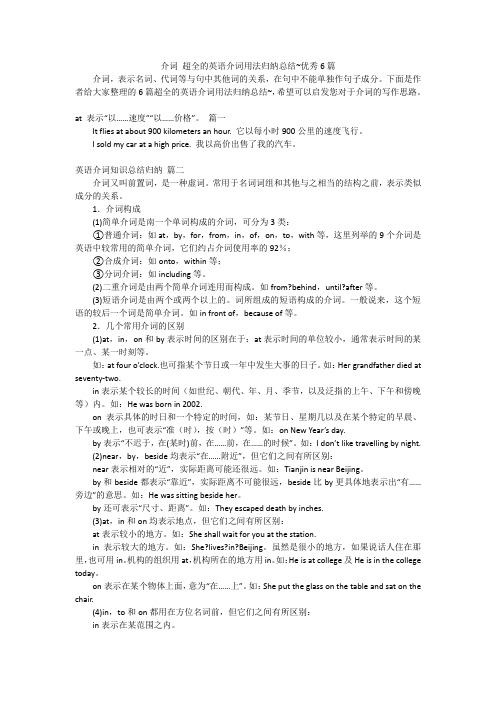
介词超全的英语介词用法归纳总结~优秀6篇介词,表示名词、代词等与句中其他词的关系,在句中不能单独作句子成分。
下面是作者给大家整理的6篇超全的英语介词用法归纳总结~,希望可以启发您对于介词的写作思路。
at 表示“以……速度”“以……价格”。
篇一It flies at about 900 kilometers an hour. 它以每小时900公里的速度飞行。
I sold my car at a high price. 我以高价出售了我的汽车。
英语介词知识总结归纳篇二介词又叫前置词,是一种虚词。
常用于名词词组和其他与之相当的结构之前,表示类似成分的关系。
1.介词构成(1)简单介词是南一个单词构成的介词,可分为3类:①普通介词:如at,by,for,from,in,of,on,to,with等,这里列举的9个介词是英语中较常用的简单介词,它们约占介词使用率的92%;②合成介词:如onto,within等;③分词介词:如including等。
(2)二重介词是由两个简单介词连用而构成。
如from?behind,until?after等。
(3)短语介词是由两个或两个以上的。
词所组成的短语构成的介词。
一般说来,这个短语的较后一个词是简单介词。
如in front of,because of等。
2.几个常用介词的区别(1)at,in,on和by表示时间的区别在于:at表示时间的单位较小,通常表示时间的某一点、某一时刻等。
如:at four o’clock.也可指某个节日或一年中发生大事的日子。
如:Her grandfather died at seventy-two.in表示某个较长的时间(如世纪、朝代、年、月、季节,以及泛指的上午、下午和傍晚等)内。
如:He was born in 2002.on表示具体的时日和一个特定的时间,如:某节日、星期几以及在某个特定的早晨、下午或晚上,也可表示“准(时),按(时)”等。
- 1、下载文档前请自行甄别文档内容的完整性,平台不提供额外的编辑、内容补充、找答案等附加服务。
- 2、"仅部分预览"的文档,不可在线预览部分如存在完整性等问题,可反馈申请退款(可完整预览的文档不适用该条件!)。
- 3、如文档侵犯您的权益,请联系客服反馈,我们会尽快为您处理(人工客服工作时间:9:00-18:30)。
英语介词用法整理早、午、晚要用in,at黎明、午夜、点与分。
年、月、年月、季节、周,阳光、灯、影、衣、冒in。
将来时态in...以后,小处at大处in。
有形with无形by,语言、单位、材料in。
特征、方面与方式,心情成语惯用in。
介词at和to表方向,攻击、位置、恶、善分。
日子、日期、年月日,星期加上早、午、晚,收音、农场、值日on,关于、基础、靠、著论。
着、罢、出售、偷、公、假,故意、支付、相反,准。
特定时日和“一……就”,on后常接动名词。
年、月、日加早、午、晚,of之前on代in。
步行、驴、马、玩笑on,cab,carriage则用in。
at山脚、门口、在当前,速、温、日落、价、核心。
工具、和、同随with,具有、独立、就、原因。
就……来说宾译主,对、有、方状、表细分。
海、陆、空、车、偶、被by,单数、人类know to man。
this、that、tomorrow,yesterday,next、last、one。
接年、月、季、星期、周,介词省略已习惯。
over、under正上下,above、below则不然,若与数量词连用,混合使用亦无关。
‘beyond超出、无、不能,against靠着,对与反。
besides,except分内外,among之内along沿。
同类比较except,加for异类记心间。
原状because of,、owing to、due to表语形容词under后接修、建中,of、from物、化分。
before、after表一点, ago、later表一段。
before能接完成时,ago过去极有限。
since以来during间,since时态多变换。
与之相比beside,除了last but one。
复不定for、找、价、原,对、给、段、去、为、作、赞。
快到、对、向towards,工、学、军、城、北、上、南。
but for否定用虚拟,复合介词待后言。
ing型由于鉴,除了除外与包合。
之后、关于、在......方面,有关介词须记全。
in内to外表位置,山、水、国界to在前。
如大体掌握如上介调用法口诀,就不易出错。
当然,至于介词的详尽用法,同形词又是连词及副词等内容此章不讲。
下面对该口诀分别举例帮助你理解消化。
早、午、晚要用in例:in the morning 在早上in the afternoon 在下午in the evening 在晚上in the day 在白天at黎明、午、夜、点与分例: at dawn, at daybreak 在黎明时候at noon 在中午at night 在夜间at midnight 在午夜以上短语都不用冠词at six o'clock 在6点钟at 7:30 (seven thirty) 在7点半at half past eleven 在11点半at nine fifteen 在9点15分at ten thirty a.m. 在上午10点30分也可以写成seven to five 5点差7分(半小时以上)five minutes after two 2点过5分at a quarter to two 1点45分at the weekend 在周末年、月、年月、季节、周即在“来年”,在“某月”,在“某年某月” (但在某年某月某日则用on),在四季,在第几周等都要用in。
例;in 1986 在1986年in 1927 在1927年in April 在四月in March 在三月in December 1986 1986年12月in July l983 1983年7月in spring 在春季in summer 在夏季in autumn 在秋季in winter 在冬季in the fist week of this semester 这学期的第一周in the third week 在第三周阳光、灯、影、衣、冒in,即在阳光下,在灯下,在树阴下,穿衣、着装、冒雨等都要用in。
例:Don't read in dim light. 切勿在暗淡的灯光下看书。
They are reviewing their lessons in the bright light. 他们在明亮的灯光下复习功课。
They are sitting in the shade of a tree. 他们坐在树阴下乘凉。
a prisoner in irons 带着镣铐的囚犯He went in the rain to meet me at the station. 他冒雨到车站去接我。
The poor dressed (clothed) in rags in old society. 旧社会穷人们衣衫褴褛.以及:in the bright sunlight 在明亮的阳光下a merchant in disguise 乔装的商人the woman in white (black, red, yellow) 穿着白(黑、红、黄)色衣服的妇女in uniform 穿着制服in mourning 穿着丧服in brown shoes 穿着棕色鞋in his shirt sleeves 穿着衬衫将来时态in...以后例: They will come back in 10 days. 他们将10天以后回来。
I'll come round in a day or two. 我一两天就回来。
We'll be back in no time. 我们一会儿就回来。
Come and see me in two days' time. 两天后来看我。
(从现在开始) after... (从过去开始)小处at大处in例:Li and I arrived at Heishan county safe and sound, all is well. Don't worry. 李和我平安地到达黑山县,一切很好,勿念。
I live in a great city (big city), my sister lives at a small town while my parents live at a village. 我住在大城市,我姐姐住在一个小城镇,而我的父母则住在农村。
I'm in Liaoning, at Anshan. 我住在辽宁省鞍山市.有形with无形by,语言、单位、材料in例:The workers are paving a road with stone. 工人们正用石子铺路。
(有形)The teacher is correcting the paper with a new pen. 这位教师正用一支新笔批改论文。
(有形)"Taking Tiger Mountain by Strategy" is a good opera. < <智取威虎山> >是—出好戏。
(无形)The product is separated by distilation into gasoline and gas oil. 这种产品是用蒸馏分离出气油和粗柴油。
(表示方式、手段、方法——无形)I really can't express my idea in English freely in-deed.我确实不能用英语流利地表达我的思想。
(表示某种语言用in)I wrote a novel in Russian. 我用俄语写了一本小说。
(同上)The kilometer is the biggest unit of length in the metric system.公里是米制中最长的长度单位。
(表示度、量、衡单位的用in )The length is measured in meter, kilometre, and centimetre. 长度是以米、公里、厘米为单位来计算的。
(同上)This board was cast in bronze not in gold. 这个牌匾是铜铸的,不是金铸的。
特征、方面与方式、心情、成语惯用in特征或状态:例: The Democratic Party was then in power. 那时民主党执政。
They found the patient in a coma. 他们发现病人处于昏迷状态。
He has not been in good health for some years. 他几年来身体一直不好。
Many who came in despair went away in hope. 许多人带着绝望情绪而来,却满怀希望而去。
The house was in ruins. 这房屋成了废墟。
The poor girl was in tears. 这个贫苦女孩泪流满面。
Her clothes were in rags. 她的衣跟穿破了。
His shoes were in holes. 他的鞋穿出窟窿了。
I only said it in fun. 我说这话只是开玩笑的。
She spoke in grief rather than in anger. 与其说她讲得很气愤,不如说她讲得很伤心。
还有一些短语也用in,如:in jest 诙谐地,in joke 开玩笑地,in spite 恶意地,in fairness 公正地,in revenge 报复, in mercy 宽大,in sorrow 伤心地等。
His mind was in great confusion. 他脑子里很乱。
Today everybody is in high spirits and no one is in low ebb. 今天大家都兴高采烈,没有一个情绪低落的。
She and her classmates are in flower ages. 她和她的同学都正值妙龄。
The compaign was in full swing. 运动正值高潮中。
方面:例:we accepted the item in principle. 我们在原则上接受了这个条款。
They are never backward in giving their views. 他们从来不怕发表自己的意见。
The backward area has achieved self-sufficient in grain. 这个落后的地区在粮食方面已能自给。
A good teacher must be an example in study. 一个好的教师必须是学习的模范。
